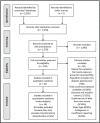Use of insulin and insulin analogs and risk of cancer - systematic review and meta-analysis of observational studies
- PMID: 24215311
- PMCID: PMC3899599
- DOI: 10.2174/15680266113136660067
Use of insulin and insulin analogs and risk of cancer - systematic review and meta-analysis of observational studies
Abstract
Background: An association of insulin use and risk of cancer has been reported but evidence is conflicting and methodological issues have been identified.
Objective: To summarize results regarding insulin use and cancer risk by a systematic review and meta-analysis of cohort and case-control studies examining risk of cancer associated with insulin use in patients with diabetes.
Data sources: Systematic literature search in 5 databases: PubMed, Embase, Web of Science, Scopus and Cochrane Library. STUDY ELIGIBILITY CRITERIA (PICOS):
Population: diabetes patients.
Exposure: Users of any exogenous insulin. Comparison: Diabetes patients with or without use of antidiabetic drugs.
Outcome: Any incident cancer.
Study design: Cohort and case-control studies.
Results: 42 eligible studies examined risk of any cancer and 27 site-specific cancers. Results of individual studies were heterogeneous. Meta-analyses were significant for: Insulin vs No Insulin: Increased risk for pancreas, liver, kidney, stomach and respiratory cancer, decreased risk for prostate cancer. Insulin vs Non-Insulin Antidiabetics: Increased risk for any, pancreatic and colorectal cancer. Glargine vs Non-Glargine Insulin: Increased risk for breast cancer, decreased risk for colon cancer.
Limitations: Few studies available for most cancer sites and exposure contrasts, and few assess effect of dose and duration of exposure. Methodological issues in several studies. Availability of confounders.
Conclusions: Insulin use was associated with risk of cancer at several sites. Cautious interpretation of results is warranted as methodological issues and limitations in several of the included studies have been identified. Choice of study design may have a profound effect on estimated cancer risk.
Figures
Similar articles
-
Selenium for preventing cancer.Cochrane Database Syst Rev. 2018 Jan 29;1(1):CD005195. doi: 10.1002/14651858.CD005195.pub4. Cochrane Database Syst Rev. 2018. PMID: 29376219 Free PMC article.
-
Systematic review and economic evaluation of a long-acting insulin analogue, insulin glargine.Health Technol Assess. 2004 Nov;8(45):iii, 1-57. doi: 10.3310/hta8450. Health Technol Assess. 2004. PMID: 15525480
-
Insulin and glucose-lowering agents for treating people with diabetes and chronic kidney disease.Cochrane Database Syst Rev. 2018 Sep 24;9(9):CD011798. doi: 10.1002/14651858.CD011798.pub2. Cochrane Database Syst Rev. 2018. PMID: 30246878 Free PMC article.
-
Newer agents for blood glucose control in type 2 diabetes: systematic review and economic evaluation.Health Technol Assess. 2010 Jul;14(36):1-248. doi: 10.3310/hta14360. Health Technol Assess. 2010. PMID: 20646668
-
[Volume and health outcomes: evidence from systematic reviews and from evaluation of Italian hospital data].Epidemiol Prev. 2013 Mar-Jun;37(2-3 Suppl 2):1-100. Epidemiol Prev. 2013. PMID: 23851286 Italian.
Cited by
-
SGLT2 inhibition slows tumor growth in mice by reversing hyperinsulinemia.Cancer Metab. 2019 Dec 11;7:10. doi: 10.1186/s40170-019-0203-1. eCollection 2019. Cancer Metab. 2019. PMID: 31867105 Free PMC article.
-
A cohort study of antihyperglycemic medication exposure and survival in patients with gastric cancer.Aging (Albany NY). 2019 Sep 13;11(17):7197-7205. doi: 10.18632/aging.102245. Epub 2019 Sep 13. Aging (Albany NY). 2019. PMID: 31518336 Free PMC article.
-
Diabetes and Breast Cancer Subtypes.PLoS One. 2017 Jan 11;12(1):e0170084. doi: 10.1371/journal.pone.0170084. eCollection 2017. PLoS One. 2017. PMID: 28076434 Free PMC article.
-
Insulin glargine use and breast cancer risk: Associations with cumulative exposure.Acta Oncol. 2016 Jul;55(7):851-8. doi: 10.3109/0284186X.2016.1155736. Epub 2016 May 6. Acta Oncol. 2016. PMID: 27150973 Free PMC article.
-
The combination of orlistat, lonidamine and 6-diazo-5-oxo-L-norleucine induces a quiescent energetic phenotype and limits substrate flexibility in colon cancer cells.Oncol Lett. 2020 Sep;20(3):3053-3060. doi: 10.3892/ol.2020.11838. Epub 2020 Jul 9. Oncol Lett. 2020. PMID: 32782623 Free PMC article.
References
-
- Vigneri P, Frasca F, Sciacca L, Pandini G, Vigneri R. Diabetes and cancer. Endocr Relat Cancer. 2009;16:1103–23. - PubMed
-
- Nicolucci A. Epidemiological aspects of neoplasms in diabetes. Acta Diabetol. 2010;47:87–95. - PubMed
-
- Pollak M, Russell-Jones D. Insulin analogs and cancer risk: cause for concern or cause célèbre?. Int J Clin Pract. 2010;64:628–36. - PubMed
Publication types
MeSH terms
Substances
LinkOut - more resources
Full Text Sources
Other Literature Sources
Medical


